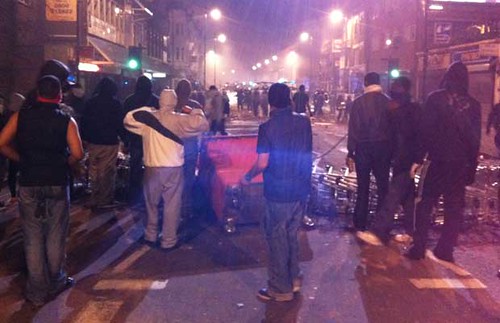
Youth watch as vehicles and buildings burn in Tottenham in North London. The rebellion has extended for another day and is spreading to other cities., a photo by Pan-African News Wire File Photos on Flickr.
The London Protest
Sunday, 14 August 2011 00:00
Nigerian Guardian
Editor Opinion
THE worldwide wind of protest against governments and their policies blowing through much of the Arab world and Western Europe berthed in the United Kingdom a few days ago. Like the Tunisian grocer, Mohammed Bouazizi, who set himself ablaze in protest against official high-handedness, the London protest was sparked off by the extra-judicial killing of an Afro-Caribbean, Mark Duggan, by the British Police on Thursday, August 4 in Tottenham, North London.
The police belong to the Operation Trident, a unit that investigates gun crime in black neighborhood in the UK and had allegedly stopped a cab that Duggan was riding in and subsequently killed him in circumstances perceived by observers and the public as reckless.
As a consequence, Duggan’s immediate community staged a protest on Saturday August 6 to demand for justice. The protest soon turned violent and spread to most parts of London, especially south east and later escalated to other major cities in the UK, such as Birmingham, Manchester, Liverpool, Nottingham, Gloucester and Leeds. The protesters were youths cutting across the multicultural cleavages of the British society.
They torched buildings, burnt vehicles and looted shops. Some people died in the process while several arrests had been made by the police trying to curb the protest in a continuing exercise.
The British leadership in its response described the event as an act of criminality by ‘broken’ and ‘sick’ Britons and indicated that a fightback was underway. This statement is more or less diversionary and does not address the critical issues that the protest has put on the public domain.
Without doubt, the criminality and the unleashing of violence on innocent souls that went with the protest are totally unacceptable, and stand condemned to that extent. The protest, however, is much more fundamental than the attempt by the British establishment to label it merely as an act by ‘criminal gangs.’
Rather, it is a manifestation of a ruptured production and distribution process in the British economy. From the Thatcher years on, the British state started a roll-back-the-state policy that has indeed wiped out the Keynesian welfarist fabrics of the British society.
The Labour Party under Tony Blair also continued the bizarre neo-liberal policies in the guise of ‘third way’ without improving the lot of the working class, and spent much of British taxpayers’ money in dubious wars in Iraq and Afghanistan blinded by the transatlantic idea.
Along the beaten track, the new coalition government of David Cameron hacked off public spending, raised taxes and increased education fees. This is precisely what the Labour MP, John McDonnell meant when he said, “We are reaping what has been sown over the last three decades of creating a grotesquely unequal society with an ethos of grab as much as you can by any means.”
The point is further supported by the liberal Independent daily, which wrote that “This disturbing phenomenon has to be understood as a conflagration of aggression from a socially and economically excluded underclass.”
Indeed, this is the task before the Cameron administration, rather than contemplating authoritarian measures such as possible eviction of the so-called rioters from council houses and censorship of the social media.
The government needs to re-tool the production structure of the British society and create more jobs for its teaming population. If anything the protest may well be a notice of worse things to come. The London Mayor indicated the possibility of more protest scene.
We recall that last December, the Rolls Royce conveying Prince Charles and Wife Camilla was attacked by students angered over the upping of school fees.
British public officials acted timely by cutting short their summer holidays to attend to the crisis in their own country. Their action, from the Prime Minister to the Mayor of London, is commendable. It is indicative of a government sensitive to the plight of its people. Such public spiritedness would be required to fix the growing contradictions of the British society.
Importantly, the London protest should not be seen as an isolated case. It is reflective of the circle of economic crisis rocking the capitalist world.
Only recently, we saw violent protests in Greece, and now it is Britain. Predictably, many more European countries, and the United States, may yet witness public disenchantment with public policies of their governments.
So are the marginal economies in the global south somewhat already signposted by the Arab spring.
Therefore, Nigerian government needs to take seriously these forebodings coming from other environments, along with the low intensity warfare going on in different parts of the country.
Government should evolve concrete solutions to social inequality in our country, and arrest growing unemployment, particularly among youth.
These issues remain a tinderbox waiting to be ignited. But a stitch in time can save nine.
No comments:
Post a Comment